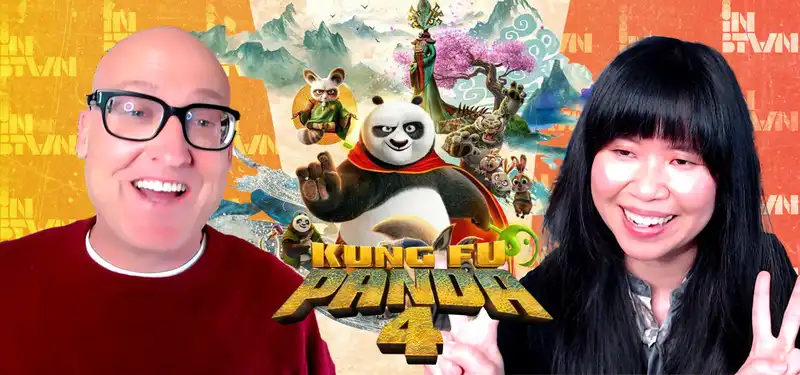Mar 5, 2024
Kung Fu Panda 4 director accepts character evolution and change
Cartoon Brew has partnered with INBTWN Animation, the exclusive partner of the online event, to talk to Kung Fu Panda 4 director Mike Mitchell and co-director Stephanie Ma Stine to get a scoop on Dreamworks Animation's latest feature, which will be released in theaters this weekend.
There are no major spoilers in this video and some minor spoilers, but if you want to see the movie completely fresh, it might be worth bookmark this interview and try to come back after a trip to the cinema this weekend.
Our discussion began with the duo explaining how the film's story is reflected behind the scenes, especially in their own mentor-mentee relationship. Ma Stein says one of Poe's greatest attributes is his ability to see good in everyone, but it is a virtue Mitchell shares:
He thinks there are pretty strong similarities there.
For his part, Mitchell, even though he is the lead director, made the film without the wisdom of Ma Stine and in-depth knowledge of the Kung Fu Panda franchise I have worked on these other things, but Stephanie knew more about previous Kung fu panda films. It was.
Mitchell said one of his most pressing concerns was maintaining the high standards for interesting villains set by these early films.I just think these villains are so rich and so deep and so fascinating.
In any franchise, there is a worry that going to the same well many times can cause audience fatigue. Ma Stein says it was something that paid special attention when solving the story of Kung Fu Panda 4:
I think the thing that so many audiences get bored with superhero movies is that the same superheroes don't actually change much. They may go a different way, slightly smaller, but they are basically the same characters. I think Logan worked on it really well. What happens when superheroes get older - for us, we can't be the same exact character every time.
She claims that in order to justify making the film in the first place, they had to create a new story for Poe, where he would mature, change and eventually pass the torch to the Dragon Warrior successor. That's where the story of a master who becomes an apprentice in cinema comes from.
Mitchell says Poe's journey of embracing change is related not only to the children and family audiences the film aspires to, but also to workers in the animation industry.
I often go from one studio to the next and contain a lot of anxiety and worry. But I hope the story we talked to Poe is that when you move on to something else, you haven't lost who you were
This metaphor extends not only to workplace changes, but also to how artists react to new technologies. Mitchell, a 30-year animation veteran, has experienced changes in seismic technology in the past and often remembers the horror that accompanies them:
I remember when it was Universal at Dreamworks, and they had all the hand-drawn desks I had at Calarts. i pushed him into the hallway. It was like a funeral; it was like a cemetery, those old desks. It was terrible, and we were startled. We're like "what happens-" but they've provided cgi courses very well, and you know, this new technology has come in. Now it's like:"
We haven't lost the past; we still have great movies that are winning awards and everyone is going to see, and yet we still use the top, top technology invented a week ago for Kung Fu Panda 4. It's all about going along with the flow and not breaking, bending with the breeze. We expect our film to get over it. But you experience change and it doesn't have to be anxious. It's evolution, and it can be full of joy and confidence.
Ma Stein says what might come, artists will always find ways to create:
I have a lot of hope. Everyone I spoke to, they adapted, they continued to be creative and found different ways to tell their own stories. Whether we still see a予算1 billion budget movie, it may be rare. But there is no way to kill the creative spirit of man, so I think that no matter what is introduced, the person who really wants to create will not stop creating.
Mitchell agrees and believes that artists need to look no further than the increasing regularity and plethora of brilliant and original animated works being posted online:
The Brewing of comics shows this all the time in their short films. Look at all the different styles and different ways to animate, and the different things you can animate. And I think it's like an exciting time with no rules. We are not following the template of what a huge audience wants to see. There may be more to it.
For the latest anecdotes and behind-the-scenes information on Dreamworks, watch the full video embedded above.
.



Post your comment